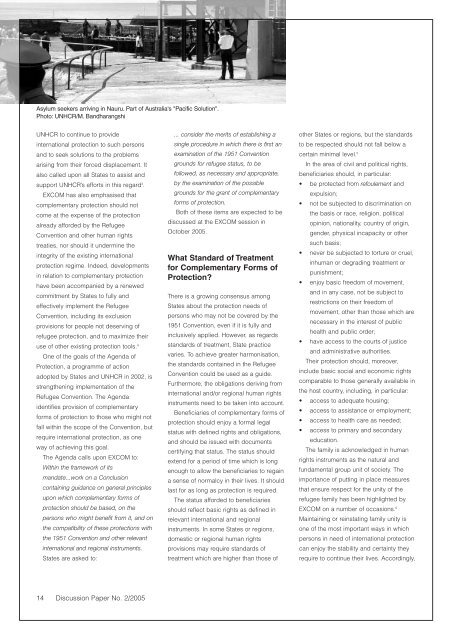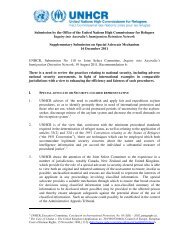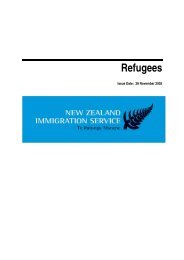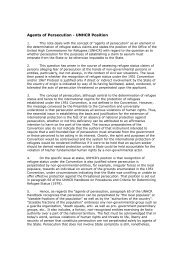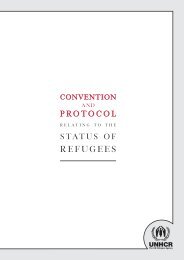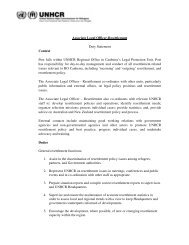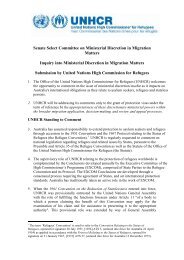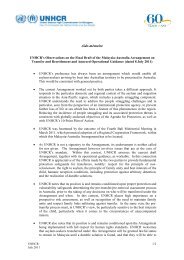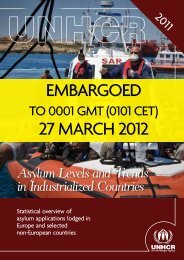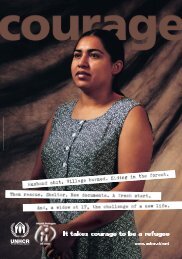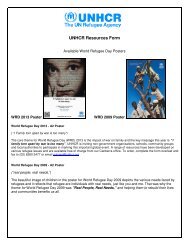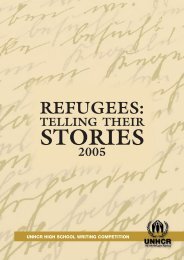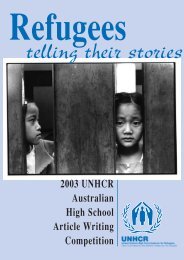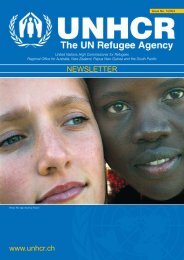Refugee Newsletter - unhcr
Refugee Newsletter - unhcr
Refugee Newsletter - unhcr
You also want an ePaper? Increase the reach of your titles
YUMPU automatically turns print PDFs into web optimized ePapers that Google loves.
Asylum seekers arriving in Nauru. Part of Australia's "Pacific Solution".Photo: UNHCR/M. BandharangshiUNHCR to continue to provideinternational protection to such personsand to seek solutions to the problemsarising from their forced displacement. Italso called upon all States to assist andsupport UNHCR’s efforts in this regard 3 .EXCOM has also emphasised thatcomplementary protection should notcome at the expense of the protectionalready afforded by the <strong>Refugee</strong>Convention and other human rightstreaties, nor should it undermine theintegrity of the existing internationalprotection regime. Indeed, developmentsin relation to complementary protectionhave been accompanied by a renewedcommitment by States to fully andeffectively implement the <strong>Refugee</strong>Convention, including its exclusionprovisions for people not deserving ofrefugee protection, and to maximize theiruse of other existing protection tools. 4One of the goals of the Agenda ofProtection, a programme of actionadopted by States and UNHCR in 2002, isstrengthening implementation of the<strong>Refugee</strong> Convention. The Agendaidentifies provision of complementaryforms of protection to those who might notfall within the scope of the Convention, butrequire international protection, as oneway of achieving this goal.The Agenda calls upon EXCOM to:Within the framework of itsmandate...work on a Conclusioncontaining guidance on general principlesupon which complementary forms ofprotection should be based, on thepersons who might benefit from it, and onthe compatibility of these protections withthe 1951 Convention and other relevantinternational and regional instruments.States are asked to:... consider the merits of establishing asingle procedure in which there is first anexamination of the 1951 Conventiongrounds for refugee status, to befollowed, as necessary and appropriate,by the examination of the possiblegrounds for the grant of complementaryforms of protection.Both of these items are expected to bediscussed at the EXCOM session inOctober 2005.What Standard of Treatmentfor Complementary Forms ofProtection?There is a growing consensus amongStates about the protection needs ofpersons who may not be covered by the1951 Convention, even if it is fully andinclusively applied. However, as regardsstandards of treatment, State practicevaries. To achieve greater harmonisation,the standards contained in the <strong>Refugee</strong>Convention could be used as a guide.Furthermore, the obligations deriving frominternational and/or regional human rightsinstruments need to be taken into account.Beneficiaries of complementary forms ofprotection should enjoy a formal legalstatus with defined rights and obligations,and should be issued with documentscertifying that status. The status shouldextend for a period of time which is longenough to allow the beneficiaries to regaina sense of normalcy in their lives. It shouldlast for as long as protection is required.The status afforded to beneficiariesshould reflect basic rights as defined inrelevant international and regionalinstruments. In some States or regions,domestic or regional human rightsprovisions may require standards oftreatment which are higher than those ofother States or regions, but the standardsto be respected should not fall below acertain minimal level. 5In the area of civil and political rights,beneficiaries should, in particular:• be protected from refoulement andexpulsion;• not be subjected to discrimination onthe basis or race, religion, politicalopinion, nationality, country of origin,gender, physical incapacity or othersuch basis;• never be subjected to torture or cruel,inhuman or degrading treatment orpunishment;• enjoy basic freedom of movement,and in any case, not be subject torestrictions on their freedom ofmovement, other than those which arenecessary in the interest of publichealth and public order;• have access to the courts of justiceand administrative authorities.Their protection should, moreover,include basic social and economic rightscomparable to those generally available inthe host country, including, in particular:• access to adequate housing;• access to assistance or employment;• access to health care as needed;• access to primary and secondaryeducation.The family is acknowledged in humanrights instruments as the natural andfundamental group unit of society. Theimportance of putting in place measuresthat ensure respect for the unity of therefugee family has been highlighted byEXCOM on a number of occasions. 6Maintaining or reinstating family unity isone of the most important ways in whichpersons in need of international protectioncan enjoy the stability and certainty theyrequire to continue their lives. Accordingly,14 Discussion Paper No. 2/2005


